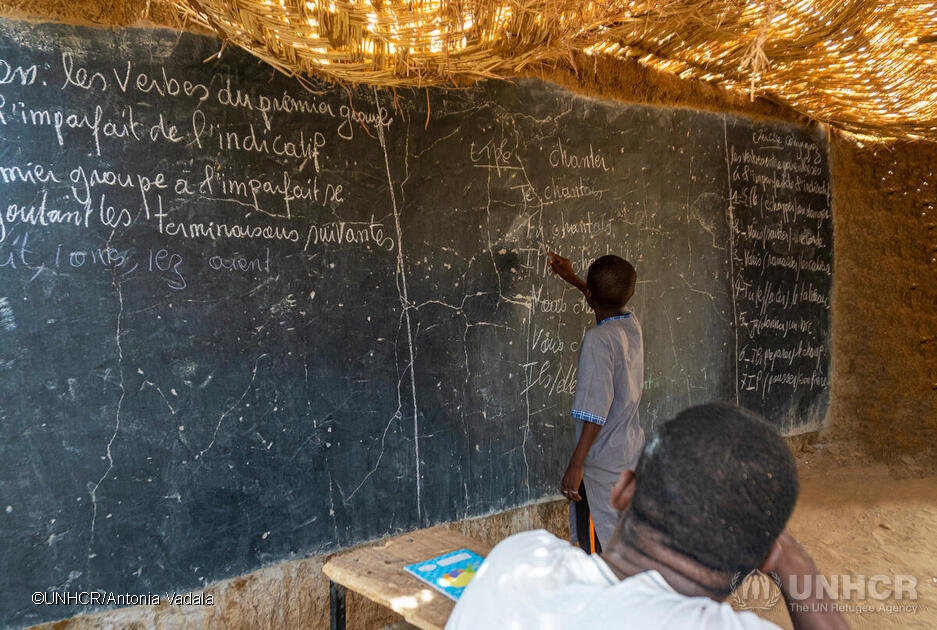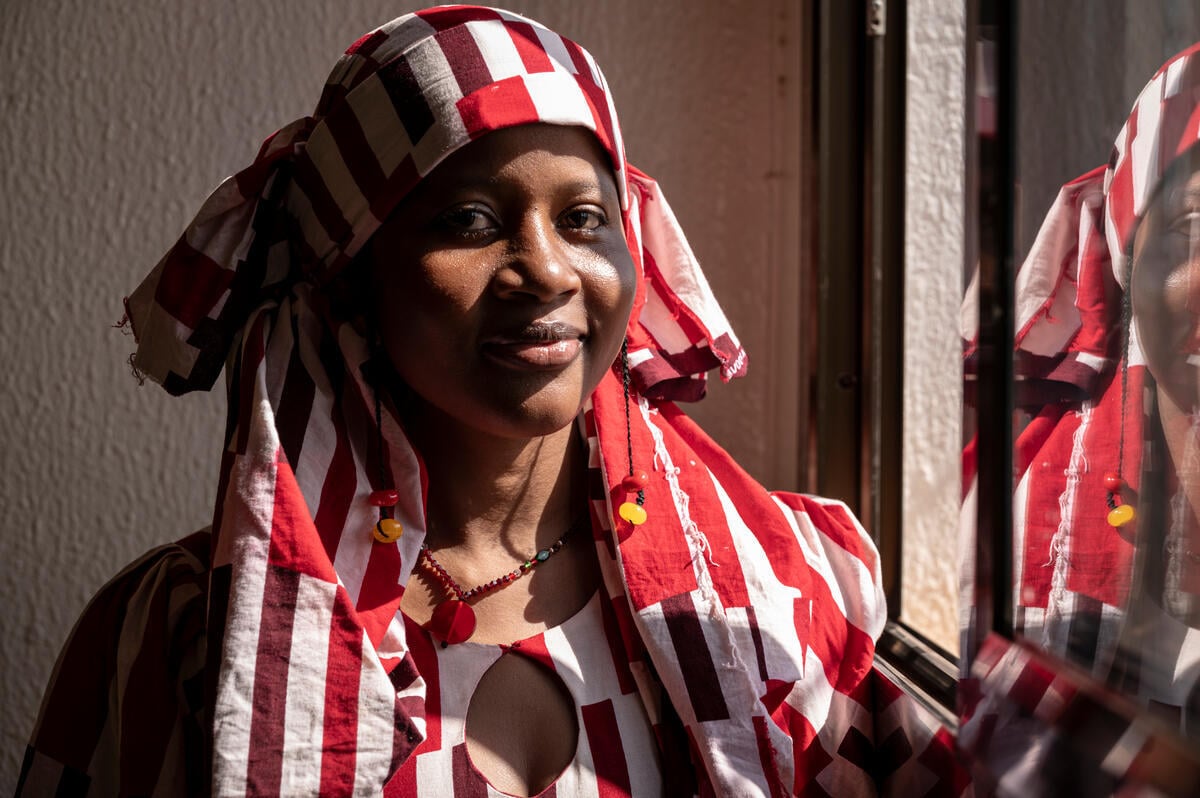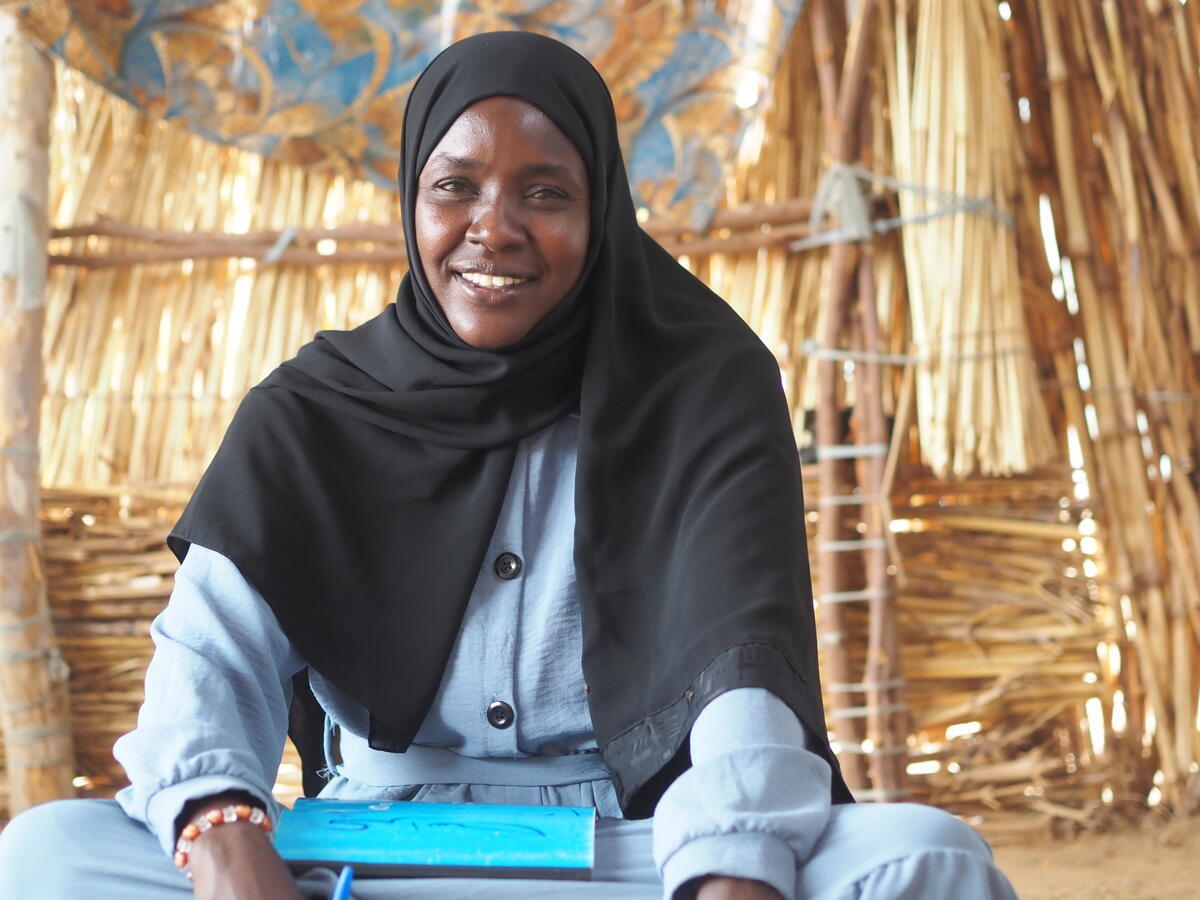Building hope and transforming lives of refugees and host communities through education in Southern Niger
Building hope and transforming lives of refugees and host communities through education in Southern Niger

Nigerian refugees and host community children benefit of education in Madaoua
It’s only 8.00 a.m. in Doukou Doukou, a small village located in southern Niger, around 45km from the border with Nigeria, yet the temperature is already approaching 40°C.
Amid the dusty, sun-baked streets, children are walking towards their school, clutching their notebooks and pens. Their happy faces can be seen from afar, glimmering with hope and determination to learn something new.
Amadou Aruna, 56, is the director of the boarding school of Doukou Doukou, attended by some 300 children. “We have been teaching in classes built in mud and thatched walls for over 8 years” he says.
Every day during the rainy season, before starting lessons, teachers and pupils need to rearrange the classroom to ensure that its walls and its roof won't collapse on them. “It's a constant battle between educating these children and ensuring their safety, with the limited resources at our disposal” he adds.
When UNHCR, the UN Refugee Agency, announced the construction of 3 classrooms with solid materials, Amadou Aruna says he thought of all the years he had watched children struggling to learn in makeshift structures that offered little protection.
Seeing the bright orange doors and windows of the new building gleaming in the sunlight for the first time, he felt he had accomplished something.
“Those classrooms don’t only allow pupils to study in adequate learning conditions, they are also our shelter against the heat, against the rain and the wind – we are grateful for those classes”, he says.
Right next to the new buildings, there is still a humble classroom made of mud and thatched walls. Here a young teacher is standing in front of a large chalkboard. His pupils, aged between 11 and 12 years, are sitting quietly on the hard, uneven wood of their benches, under the thatched roof which provides a bit of shade in the class, eager to learn.
They were studying the conjugation of the first group verbs in French. A young boy in a grey traditional agbada is called to the chalkboard, he gets up and makes himself a way between the closely placed benches. His name is Hassan, he starts reading the conjugation of the verb "chanter" (repeating in French), his voice trembles as everyone in the classroom is looking at him, but he remains confident since he had studied. The other children watch and listen, then slowly repeat after him the words he is pronouncing.
The class is not as full as it should have been, “Many children are not here today so we cannot go further with the program, it’s Thursday and it’s market day so they need to help their families to sell their animals” says the teacher.
In reality, families' survival needs are often prioritized at the expense of children's education - a plague which affects countless communities, and not only during displacement. Despite the students’ enthusiasm and the teachers’ dedication, access to education remains challenging in this part of the world. Nigerian refugees and host communities in southern Niger face immense challenges to receive a quality education, including lack of resources and proper buildings where to study.
To those challenges, the 36,000 Nigerian refugees that fled into the Bangui district in the Tahoua region since August 2021 face, must be added the fear of incursions from non-identified armed groups.
Many refer to this area as a "no man's land" - a place devoid of security forces, making the community an easy target for armed groups which conduct brutal raids, kidnapping for ransom and lootings. The refugees live in constant fear of the next attack, knowing that no help will come to their rescue, which occasionally translates into preventive movements.
UNHCR, the Government of Niger and its partners dedicate their efforts to help refugees in the Tahoua region, ensuring that they are welcomed, protected, and provided with the necessary resources to rebuild their lives.
Everyone who has succeeded in life has studied, and I want that for my children
One of UNHCR priorities is to ensure that every child has access to education by enrolling each of them in the Niger's national education system and providing them with the infrastructure and equipment needed to thrive.
Through education, these children can aspire to a brighter future, one where they can overcome the traumas of their past and make a difference for the future generations.
“Everyone who has succeeded in life has studied, and I want that for my children” says Rabi Sallou, 55 years, from the village of Jataka.
As part of the education project, the mother of 6, was provided with goats. Through their breeding, she can sell them and use the proceeds to support the education of her children. It is a relief knowing that she used to be faced with the difficult choice of deciding which child to send to school, as her income was insufficient.
In 2022, with the support of Education Cannot Wait, UNHCR has overseen the construction of 12 classrooms in the Bangui commune accommodating around 600 pupils. An accelerated education and literacy program is also offered for young people with specific needs between the ages of 7 and 12, which currently includes 193 pupils who have never attended school.
Lawli Ibrahim is one of them, he is only 10 years old, but has already been through a lot. He lives with a disability affecting his legs and cannot walk on his own, but he has been given the opportunity to learn and grow alongside other young boys and girls and is determined to get an education, just like any other child his age.
“Getting to school was not easy for me, I always needed someone to bring me and pick me up. Since I received my tricycle, I now have the freedom to go to and come back from school on my own, without having to rely on others for assistance” Lawli says with a big smile.
For Lawli, that tricycle represents his access to a dignified life in which he can join his classmates with newfound confidence, knowing that he has the means to go to school and learn just like any other child.
Despite the tireless efforts and the continuous support of Education Cannot Wait, the reality is that the situation at the border with Nigeria remains dire. The ongoing violence and insecurity have forced around 4,000 refugees to flee and seek safety in Madaoua department since the beginning of 2023.
The UNHCR staff of the Madaoua field unit and the Government continue to work hand in hand to support those influxes. The challenges are numerous, but perhaps none are as daunting as the sheer number of students in each primary school class. With an average class size of 50 students, resources are stretched thin and to make matters worse, around 200 classes are still held by thatched walls in the Bangui commune.
Come what may, students remain eager to learn. They show up to school and their resilience to shocks is awe-inspiring. It’s a reminder that education is a powerful tool that can help overcome even the most daunting of challenges.








